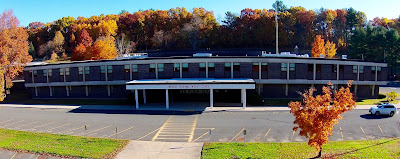Ron Bohonowicz extolled the southwest view to consider for library location
The Wildwood School Building Committee met yesterday in the Middle School for the first time since the Amherst School Committee pretty much boxed them in for building designs with their controversial 4-1 vote in favor of grade reconfiguration that requires two separate schools under one roof.

Amherst School (aka Wildwood) Building Committee yesterday
After almost two hours of painstaking presentation of four options that meet the ASC requirement, Building Committee Chair Mike Morris pretty much dismissed two of the options because they require "swing space" -- a temporary location to hold classes for all the students displaced by construction.
Four options (pretty much whittled down to two)
Mr. Morris pointed out there are no spaces in Amherst large enough to handle all the Wildwood students and so the Schools would have to rent space at six or eight different locations strewn about the entire town.
Therefor due to "safety, learning and transportation considerations" he would prefer to avoid using swing space. Superintendent Maria Geryk was nodding her head in agreement as he spoke.
Since the presentations took up most of the scheduled time for the two hour meeting the group will discuss and decide at their next meeting February 2, but it's pretty safe to assume the choice will be between W10 ($60,893,000) and W12 ($67,176,167).
Maria Kopicki warns during Public Comment that public sentiment needs to be more carefully considered
Coincidentally the Amherst Finance Committee met in Town Hall just after the School Building Committee adjourned and during the "member report" Marylou Theilman brought up the school building project.
She presented a spreadsheet to the FinCom showing cost options for the Amherst short list as well as the most recent costs of school projects across the state financed by MSBA.
One member wondered what the role of the Finance Committee would be in this process? Chair Kay Moran pointed out they are advisers to Town Meeting, and it would be Town Meeting and then the voters who approve a debt exclusion Override to fund the new school construction project.
And even after it passes Town Meeting, although Ms. Moran thought it would be a "high hurdle" because it requires two-thirds support, it could still fall under their purview to educate the voters as to the financial implications of a yes vote: A $200 year tax increase for 30 years on an average home.
And maybe where Amherst currently sits for property tax rates statewide (in the top ten).
Ms. Theilman did say she was somewhat surprised when talking to one of the architects to learn that the moisture problems at Wildwood or Fort River would be solved by a simple renovation. The old foundation is dug up, removed, and a moisture barrier installed before a new foundation is poured.
School & Construction officials appear before Amherst Select Board 1/11/16 with Vince stalking in background










































































